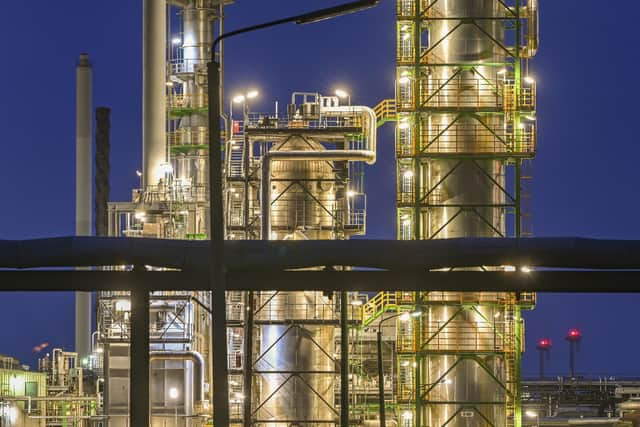Russian oil sanctions: New EU sanctions explained as well as Hungary and Slovakia Russian oil exemption
The proposal needs unanimous approval from EU countries and is likely to be debated fiercely with Hungary and Slovakia relying heavily on Russian oil.
In the past both countries have already said they will not take part in any oil sanctions, and could be granted an exemption due to their reliance on the supply.
Advertisement
Hide AdAdvertisement
Hide AdA compromise was made at a two-day summit focused on helping Ukraine with a long-delayed package of new financial support.


The embargo covers Russian oil brought in by sea, allowing a temporary exemption for imports delivered by pipeline, a move that was crucial to bring landlocked Hungary on board a decision that required consensus.
What are the EU sanctions?
The sixth set of sanctions from the bloc are set to further target the Kremlin with the proposal banning oil imports from Russia.
The plan would see EU countries phasing out Russian oil in one year.
The new embargo covers Russian oil brought in by sea, allowing a temporary exemption for imports delivered by pipeline, a move that was crucial to bring landlocked Hungary on board a decision that required consensus.
EU Council President Charles Michel said the agreement covers more than two-thirds of oil imports from Russia. Ursula Von der Leyen, the head of the EU’s executive branch, said the punitive move will “effectively cut around 90% of oil imports from Russia to the EU by the end of the year”.
The new package of sanctions will also include an asset freeze and travel ban on individuals, while Russia’s biggest bank, Sberbank, will be excluded from SWIFT, the major global system for financial transfers from which the EU previously banned several smaller Russian banks. Three big Russian state-owned broadcasters will be prevented from distributing their content in the EU.
How much Russian oil and gas does the EU use?
The EU currently pays Moscow £341bn for oil and gas. Russia supplies 27% of the EU's imported oil and 40% of its gas.
Advertisement
Hide AdAdvertisement
Hide AdSo far, no sanctions on Russian gas exports to the EU have been put in place, although plans to open a new gas pipeline from Russia to Germany have been frozen.
How reliant are Slovakia and Hungary on Russia gas?
The ban will only affect oil that arrives by sea but not pipeline oil, following opposition from Hungary which is heavily reliant on Russian imports.
The numbers vary but both nations are very heavily reliant on EU oil imports, with both nations being served by the Druzhba pipeline which brings Russian oil to Europe.
According to the International Energy Agency, Slovakia and Hungary are thought to have received 96% and 58% of their crude oil and oil products imports from Russia last year.
Slovak Economy Minister Richard Sulik said on Tuesday the country’s sole refiner, Slovnaft, cannot immediately switch from Russian crude to another kind of oil. Changing the technology would take several years, Sulik said.
“So, we will insist on the exemption, for sure,” Sulik told reporters.
Slovakia’s almost fully dependent on Russian oil it receives through the Soviet-era Druzhba pipeline. Hungary is also heavily reliant, though other major energy importers like Germany said it could cope if the EU banned Russian oil, with officials still noting “it is a heavy load to bear”.
Hungarian Foreign Minister Peter Szijjarto said the country will not vote for any sanctions “that will make the transport of natural gas or oil from Russia to Hungary impossible”.
Advertisement
Hide AdAdvertisement
Hide Ad“The point is simple, that Hungary’s energy supply cannot be endangered because no one can expect us to allow the price of the war [in Ukraine] to be paid by Hungarians,” Szijjarto said, speaking Tuesday in Kazakhstan. “It is currently physically impossible for Hungary and its economy to function without Russian oil.”
What happens if Hungary and Slovakia do not vote for the proposals?
Hungary and Slovakia would have to notify the Commission of any plans to make use of the exemption, and would need to set out the terms of any ongoing oil deals.
Members of the EU hope that such a compromise could be a way of getting both on board, with Hungary in the past being one of the major stumbling blocks for sanctions against Russia. However, it could also start a precedent for suspensions, with Czech Prime Minister Petr Fiala telling reporters his country also wanted a postponement, of two to three years.
According to a Commission document seen by Politico, "the competent authorities of Hungary and Slovakia may authorise the execution until 31 December 2023 of contracts" concluded before the new sanctions package enters into force, "or ancillary contracts necessary for the execution of such contracts."
If they did not vote for the proposals, a deal would need to be struck to ensure the EU could proceed with its plan to not buy Russian oil and gas.
Karol Galek, a deputy economy minister in charge of energy policy said that the EU proposals do not give Slovakia or Hungary enough to work without Russian oil.
He said: "This is unfortunately not enough. We are expecting at least three years.” but added that by the end of 2025, the switch away from Russian oil should be possible. He added: "This is the time when we will be able to make the pipeline stronger. And to change the technology."
